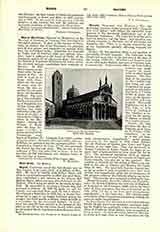

Masses, BEQUESTS FOR (CANADA)—The law governing bequests, being concerned with “property and civil rights”, falls within the legislative competency of the provincial legislatures, not of the Dominion Parliament. The basic law in all the provinces is, however, not the same. Any question concerning bequests is, therefore, one of provincial, not Dominion law. There is no statute enacted by any of the legislatures specially affecting bequests for Masses.
Quebec.—In this province there is no question of the validity of such bequests. The basic law is the French law as in force in the province at the time of the cession (1759-63). Whether such bequests were or are valid under English statutory of Common Law, is immaterial. Under article 869 of the Civil Code a testator may make bequests for charitable or other lawful purposes. The freedom of the practice of the catholic religion being not only recognized but guaranteed, as well under the Treaty of Cession (1763) as under the terms of the Quebec Act (1774), and subsequently Provincial Legislation (14 & 15 Vic., Can., c. 175) having confirmed that freedom, a bequest for the saying of Masses is clearly for a lawful purpose.
Ontario—In this province the law for England, as in force on October 15, 1792, introduced “so far as it was not from local circumstances inapplicable”, under powers conferred by the statute of 1791, which divided the old Province of Quebec into Lower and Upper Canada, is the basic law. That Act preserved to Roman Catholics in Upper Canada the rights as regards their religion secured to them under the Act of 1774. The provincial legislation cited as regards Quebec being enacted after the reunion of Upper and Lower Canada, was also law in this province. The validity of bequests for the saying of Masses was upheld in the case of Elmsley and Madden (18 Grant Chan. R. 386). The court held that the English law, as far as under it such dispositions may have been invalid, was inapplicable under the circumstances of the province, wherein the Catholic religion was tolerated. This case has been accepted as settling the law.
British Columbia, Manitoba, Alberta, and Saskatchewan.—In British Columbia the civil law of England, as it existed on November 19, 1858, and in the three other of these provinces, that law as it existed on July 15, 1870, “so far as not from local circumstances inapplicable”, is the basic law. The Ontario judgment above cited is in practice accepted as settling the question under consideration.
In Nova Scotia, New Brunswick, and Prince Edward Island, though here is no statutory enactment making the English law applicable, it has, since the acquisition of Acadia by Great Britain, been recognized as being in force. In these provinces, however, that law in so far as it may treat as void dispositions for the purpose in question as being for superstitions uses, has always been treated as inapplicable. The validity of such bequests was maintained in an elaborate judgment of Hodgins, Master of the Rolls, in an unreported case of Gillis and Gillis in Prince Edward Island in 1894.
CHAS. J. DOHERTY

